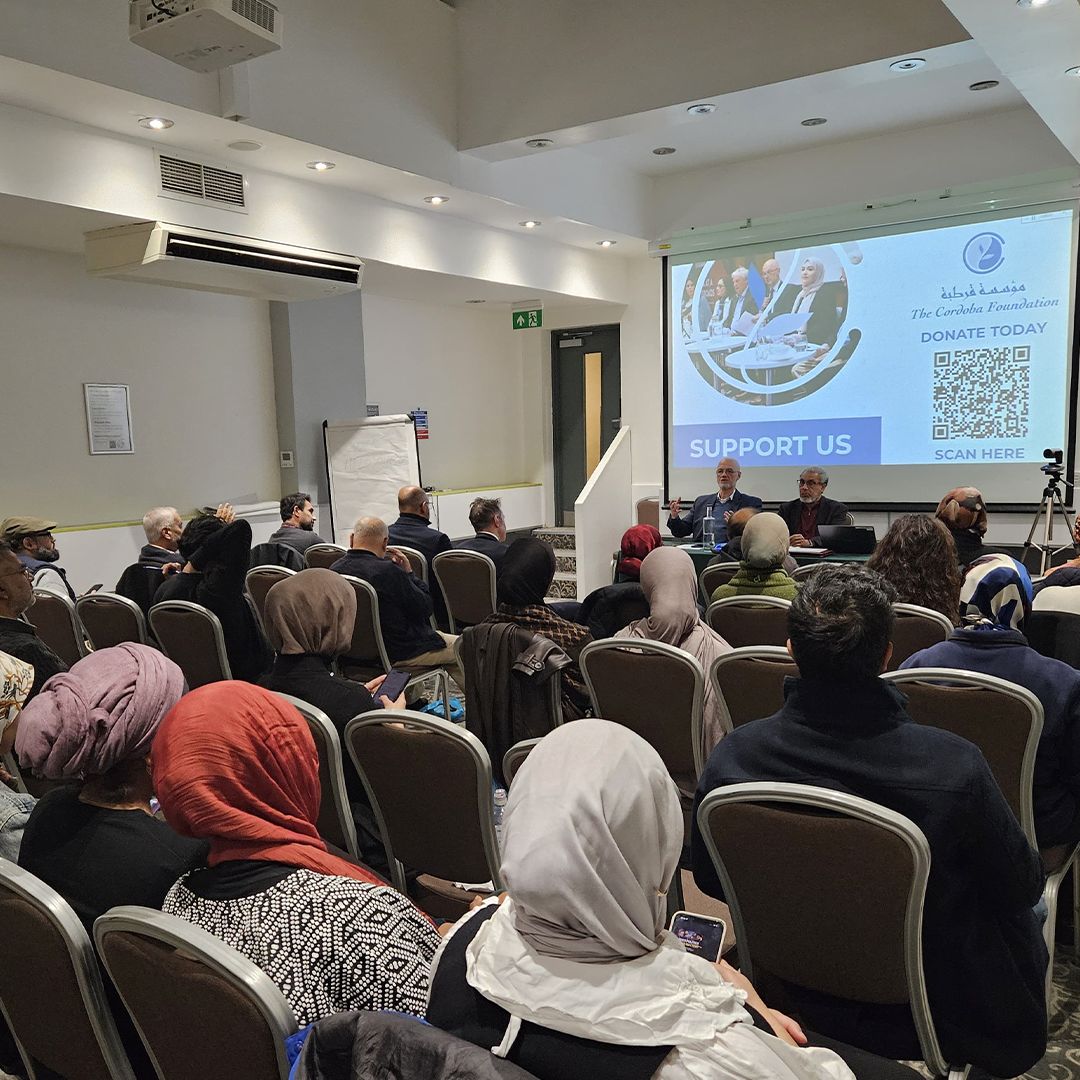
The Cordoba Foundation and Middle East Monitor
Event Review by Nasim Ahmed
7 November, 2025, London
Faith-inspired liberation: uncovering Islam’s role in slave uprisings in the Americas
The Cordoba Foundation hosted the official launch of Dr Daud Abdullah’s latest book published by Hansib Publications, titled, Islam, Race and Rebellion in the Americas: Transatlantic Echoes of the West African Jihads, in London on 5th November. The event brought together academics, journalists, historians, and community figures to explore and reflect on a major work, by the director of the Middle East Monitor. Abdullah’s book challenges dominant narratives surrounding slavery, race, and resistance in the Atlantic world, highlighting how Islam served as a source of identity, resilience, and defiance against structural racism.
The launch brought together key figures connected to the themes of the book. Chairing the evening, Dr Anas Altikriti, Founder of The Cordoba Foundation, described the book as “an act of intellectual recovery, a reminder that the enslaved were not just victims, but thinkers, strategists, and believers who fought back through faith.”
In his presentation, Abdullah offered an overview of the book’s key arguments and historical themes, tracing the intellectual and spiritual legacy of enslaved West African Muslims in the Americas. His reflections were followed by a contribution from Shaykh Dr Abdullah Hakim Quick, who joined via Zoom from Canada to share insights on the book’s relevance to contemporary struggle against the erasure of Muslim contributions and advancing the ongoing pursuit of justice. Political activist and founder of Operation Black Vote Lee Jasper, who was scheduled to speak, was unable to attend due to travel disruptions caused by storms in the Caribbean.
Abdullah opened the event with a short address outlining the central thesis of his book: to recover the intellectual and spiritual roots of slave rebellions in the Americas. “The subject of slavery and rebellion,” he told the audience, “defines identity — their identity, their personality, their self. My work examines the central role that Islam played in sustaining that identity under the most brutal of conditions.”
Continuing the theme of resistance Abdullah said: “Slavery in the Americas was one of the most horrific chapters in human history. Millions of Africans were uprooted from their homelands and transported across the Atlantic to toil under the most inhumane conditions. Yet, within this brutality, there were also stories of resistance and resilience. Among the enslaved were Muslims from West Africa who carried not just their physical selves, but a rich tradition of faith, learning and cultural identity.”
Central to Islam, Race and Rebellion in the Americas is a powerful argument: that Islam was not merely a fading tradition among the enslaved, but a dynamic, unifying force that fuelled organised resistance and revolt against slavery. Drawing on extensive archival research, Abdullah reveals how the jihad movements of West Africa, such as those led by Shaykh Usman dan Fodio and other reformers, inspired revolts and uprisings across the Atlantic world against the brutality of plantation slavery.
“The reformers of West Africa discharged their canonical obligation to wage jihad against oppression.” Abdullah explained. “In all these movements, the role of the jama’a cannot be ignored. It was, on all occasions, the vital vehicle that enabled diverse groups to work and struggle for a revolutionary cause. Similarly, in the Americas, slaves from different tribal backgrounds came together to free themselves from the tyranny of plantation slavery. Whether it was against slavery or Paganism, the tradition of jihad was well entrenched in the experiences of Muslims in West Africa, as well as the slave colonies of the Americas.”
The book traces the historical roots of transatlantic slavery, beginning with Portugal’s early trade in African slaves during the 15th century, justified through papal decrees and religious edicts. Abdullah links this to the crusading mentality that defined Iberian expansion after the Reconquista, showing how anti-Muslim hostility was exported to the New World. “The centuries of struggle for dominance between Christians and Moors in Iberia,” he said, “were replayed with new actors and new victims in the Americas.”
A major strength of the book is its detailed reconstruction of Muslim-led revolts in the Americas. Among the most notable was the 1835 Bahia uprising in Brazil, where Muslim slaves — many of Yoruba and Nupe heritage — organised a rebellion inspired by Islamic teachings, using Arabic literacy and mosque networks for coordination. Abdullah’s discussion of the revolt includes rare reproductions of handwritten Qur’anic verses found in the archives of the Islamic Cultural Centre in Salvador, which he describes as “sacred evidence of resistance.”
Abdullah also revisited some of the earliest recorded instances of Muslim resistance in the Americas, such as the 1521 Wolof uprising in Hispaniola, the first recorded slave rebellion in the Caribbean, and the involvement of Muslims like Francois Makandal in the Haitian struggle for independence. Makandal, a marabout and healer, planned to expel the French from Haiti before being captured and executed in 1758. “These figures were not anomalies but part of a long continuum of faith-inspired resistance that linked West Africa to the Americas,” said Abdullah.
The book situates itself within a long-standing academic debate. Was slavery primarily an economic system, as argued by Eric Williams, or a racial one, as advanced by Nikole Hannah-Jones and others? Abdullah contends that Islam provided the intellectual and moral framework for resistance, serving as both a counter-narrative and an organising ideology against enslavement.
“Islam in the Americas was not merely a cultural residue or a passing set of rituals,” said Abdullah. “It was a continuous intellectual and political movement — a central force behind rebellion and the preservation of identity. It gave the enslaved a language of justice, a concept of divine accountability, and a vision of freedom beyond the material world.”
The book’s six chapters explore this thesis comprehensively. Chapter 1 examines the legacies of the Crusades in shaping European attitudes toward African Muslims. Chapter 2 compares Iberian and Anglo-Saxon justifications of slavery. Chapter 3 explores jihad traditions in West Africa. Chapter 4 focuses on slave revolts and Muslim leadership. Chapter 5 looks at the legacy of these struggles in the 19th century, while chapter 6 traces their intellectual influence on modern movements such as the Nation of Islam and Pan-Africanism.
In his remarks, Abdullah reflected on these later developments: “The Pan-African movement, the Back-to-Africa initiatives, and even the rise of the Nation of Islam in the 20th century all drew upon this reservoir of historical memory. The spirit of resistance was never extinguished; it evolved.”
Dr Abdullah Hakim Quick praised the author’s contribution, calling the book “a vital corrective to a Eurocentric historical tradition that has erased the agency of African Muslims.” He went on to stress: “We are witnessing again the rise of a vicious Islamophobia that distorts history and denies the depth of our legacy. This book brings that legacy back to life — it allows us to reclaim our story.”
The discussion also turned to the relevance of the book to contemporary struggles. Audience members drew parallels between the historical silencing of enslaved Muslims and the present-day marginalisation of Black and Muslim communities in Europe and the Americas. Abdullah noted that his study was not merely academic but moral. “History has consequences,” he said. “When we erase the contributions of Muslims and Africans, we erase part of humanity’s struggle for justice.”
In the latter part of the book, Abdullah explores how Islamic revivalist ideas re-emerged in the Americas during the 20th century, shaping movements from Marcus Garvey’s Pan-Africanism to Malcolm X’s transformation through Islam. He also includes personal reflections on his own encounters with Muslim activists in Guyana and the Caribbean in the 1970s, drawing connections between those experiences and earlier reformist traditions in Africa.
Islam, Race and Rebellion in the Americas is a major scholarly contribution that redefines how we understand slavery, race, and liberation. Through a combination of rigorous historical analysis, Abdullah restores the role of Islam as a sustaining force of resistance to systematic oppression and injustice.
The Cordoba Foundation congratulates Abdullah on this ground-breaking work and thanks participants and speakers for contributing to a rich exchange of ideas – a reminder that meaningful conversation remains at the heart of positive change.
Notes:
- Islam, Race and Rebellion in the Americas is available to purchase from Hansib Publications: www.hansibpublications.com
- Support the work of The Cordoba Foundation: https://www.launchgood.com/v4/campaign/support_the_cordoba_foundation__keep_dialogue_alive


